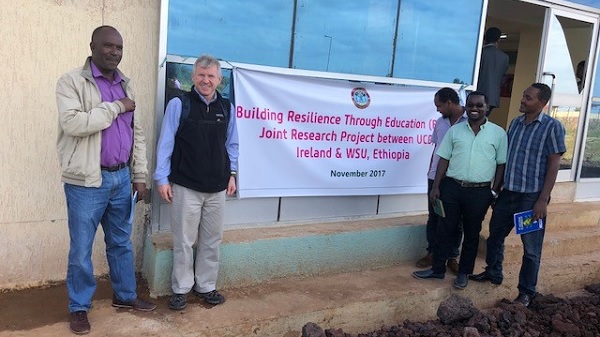
The Build Resistance Through Education (BRTE) program focuses on the power of education to generate transformative change & will work towards building the capacity of Wolaita Sodo University to transform the livelihoods of the local people
By Darren Hassett (Carlow Live)
Institute of Technology Carlow (Carlow, Ireland) has partnered with the University College Dublin’s Centre for Humanitarian Action, Concern Worldwide, Future Analytics and Wolaita Sodo University (WSU) in Ethiopia as part of a European-funded Horizon 2020 project which aims to Build Resistance Through Education (BRTE).
The BRTE program sees academia working with established relief and development agencies to transform the livelihoods of communities around the world as part of the global effort to meet the commitments to the United Nations 2030 Sustainable Development Goals (SDGs).
The SDGs are the blueprint to achieve a better and more sustainable future and they address global challenges, including those related to poverty, inequality, climate, environmental degradation, prosperity, peace and justice.
BRTE has its origins in an evaluation of the impact of Concern Worldwide’s 25-year engagement in the Wolaita Zone of Ethiopia which was conducted by University College Dublin’s Centre for Humanitarian Action in collaboration with Wolaita Sodo University, an important element of building partnership.
It found that, despite significant improvements in communities’ capacities to both absorb recurring disasters and to adapt their livelihoods based on experience of recent disasters, they remain extremely vulnerable to recurring climatic stresses.
The BRTE program focuses on the power of education and innovation to generate transformative change and will work towards building the capacity of WSU to radically transform the livelihoods of the regional population in Sodo and the wider Wolaita Zone.
Institute of Technology Carlow has an established and widely recognized record of accomplishment in knowledge transfer and delivering innovation solutions, and is committed to promoting innovation, entrepreneurship, start-up businesses and transferring technology and know-how for socio-economic development.
The Institute provides a structured suite of specialized integrated supports, training and advice through which companies and other groups may engage with facilities, staff and networks to develop their enterprises.
The model includes solving close-to-market needs, maximizing the impact of research led intellectual property, assisting entrepreneurs and start-ups and delivering inter-regional and sustainable benefits.
This pragmatic model, which has been the Institute’s primary role in the BRTE project, will be studied to see how it can best be adapted and implemented in the Ethiopian context.
Through the BRTE program, Institute of Technology Carlow staff will work closely with partners in Ethiopia to share knowledge and expertise in areas such as innovation, entrepreneurship and in supporting regional socio-economic development.
Dr Pat Gibbons, Director, UCD Centre for Humanitarian Action at UCD, and the co-ordinator of the BRTE project said: “Due to the protracted and recurring nature of climatic shocks and stresses in that area, there is a need for a paradigm shift in the way aid is delivered to meet immediate life-saving assistance while working towards the UN’s Sustainable Development Goals.
“Humanitarian action and development stakeholders need to seek new ways to engage with vulnerable African communities to achieve greater societal transformation and work towards a more equitable agenda for humanity.”
He added: “The BRTE partnership has identified education as a key factor in bringing about this transformative change and over the next 4-years the partnership aims to build local agency by supporting the education, research and innovation capacity of the Wolaita region. Institute of Technology Carlow is a key partner in the BRTE process.
“Scholars from WSU will see at first hand the rich contribution that IT Carlow is making to promote enterprise and innovation in the South East and beyond.
“Ireland’s contribution to developments in disaster prone areas like Wolaita will be elevated from charity in the 1980s to shared learning and mutual gain through economic development in the 21st century.”
Speaking during a visit by representatives from WSU and UCD to Carlow last week, Dr David Ryan, Director of Planning and Research at Institute of Technology Carlow said: “We are a globally engaged organization and recognize our responsibility as educators to ensure sustainable development.
“Our new Strategic Plan prioritizes our role in working towards strengthening the capacity of individuals, communities and countries to make judgements and choices in favor of creating a sustainable and resource efficient economy, founded on a fair and just society, which respects ecological limits.
“We look forward to working with our project partners and to honoring our commitments to the UN Sustainable Development Goals and to Ireland’s International Development Policy.”
Source: Carlow Live
